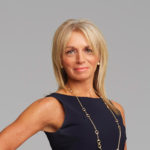When Vicky Carter, Guy Carpenter’s chairman of Global Capital Solutions, International, started working in the insurance industry 40 years ago, she was one of only a handful of women. She reflects here on how the industry has changed and the opportunities that exist today.
It took enormous courage to walk into Lloyd’s for the first time and into the underwriting room—also known as “The Room.” I was a very junior broker with absolutely no experience, tasked with having to find Mr. Smith on Box 390 and get my endorsement agreed. On entering The Room with a map of the syndicate locations, it was just a sea of gray and black suits across two floors. It was such a daunting experience that I walked in one door, through the room and straight out of another!

I began my career studying medicine at St Bartholomew’s Hospital in London. During a gap period, my father was insistent I go and earn some money and encouraged me to take a job in the city. At the time, I could not think of anything more boring—it was not my scene. In those days, the city conjured up images of pale, stale and male.
My very first job was in an underwriting names agency, where I think I reduced the average age by a few decades. Every Thursday we would meet the underwriters at lunchtime in the Green Man in Moorgate. They very quickly suggested I move onto a box and train as an underwriter. But I was swiftly notified, “Sorry, no females on the box.”
So, broking was the only option. Following, in hindsight, some of the best advice I ever received, I applied as a junior broker to a small but dynamic reinsurance operation called Winchester Bowring. After being interviewed by the CEO on Jan. 8, 1980, I began my career in broking and never did go back to medicine.
Slowly Turning the Tide
So much has changed in both the insurance industry and society since that time, particularly in the last few years, thanks to movements such as #MeToo. Diversity and inclusion initiatives are front-lined in every company today, and businesses are making dramatic changes to ensure they address issues such as the gender pay gap.
Lloyd’s, for example, reported a gender pay gap of 19.9 percent in 2018, down from 27.7 percent in 2017, and has committed to meeting a 50:50 gender balance on external recruitment long lists. However, there is still plenty of work to be done.
According to PwC, the UK insurance industry had a mean gender pay gap of 29 percent in 2018, way above the national average of 14 percent, driven primarily by the relatively low number of women in senior roles.
The Lloyd’s market is currently implementing a series of measures to tackle cultural issues within the marketplace, and it has endured a number of negative stories relating to how women have been treated. Undoubtedly, some people have had bad experiences and unacceptable behavior needs to be addressed, head on. But no female should be put off working in insurance.
The London market and the wider insurance sector provide a fantastic industry for building a career. The market offers the chance to follow interests across so many aspects of life, and the opportunities are unending. I’ve met remarkable people, made great friendships and been on an incredible journey. Nothing has held meback in my career.
In 1992, I set up my own broking operation—first under the Lloyd’s umbrella of Bell & Clements, then as an independent broker a few years later in 1995, making me the first female to establish and run a Lloyd’s broking operation. It was a big thing, and it was extremely satisfying to launch my own business. We had fantastic support from clients such as Beazley, Hiscox, Liberty Mutual and Kiln, and we developed a tremendous client base. We were a tiny independent company fighting the giants.
I do feel, however, that as a woman I had to work a lot harder to prove myself as I worked my way up the corporate ladder.
But attitudes are changing, and insurance businesses must ensure they are aligned with modern thinking from the top, right to the bottom. In some companies, senior management may be engaged while middle management may still be very much stuck in the stuffy, protective and old-fashioned culture of days gone by.
Diversity, Fairness and Opportunity
Companies have got to adapt their structures to enable smart, young, diverse individuals to come forward. The advantage for any company of having a diverse workforce is diversity of thought and imagination. Boards should be made up of people who see things differently and challenge each person to make good decisions.
However, I am anti-quotas. For someone to get a job over someone else just because they fill a quota does a disservice to the people who have had to fight their way to the top based on ability and hard work. I believe in fairness and equality of opportunity and that individuals should be judged purely on their capabilities and attitude.
No one should expect anything to be handed to them on a plate. You need to work hard to prove to people that you are capable of the opportunity you’re given. That’s how you gain respect, and respect is extremely important in this business, as is building trusting relationships.
Throughout my career, my attitude was always, “I will do my utmost for my clients.” People know that if I say I’ll do something, I’ll get it done, whatever it takes. I always aim to excel in everything I do, or there’s no point doing it. Hard work and dedication will get you far.
There are no ceilings in this industry, only imagined ones. Being different provides an opportunity to differentiate yourself. Embrace that difference and see it as an opportunity. I’m a great believer that you should never try to be like the rest of the pack.
And if you’ve got somebody unjustly standing in your way, you need to make a decision to move somewhere that they are not. In today’s world, there is so much opportunity—it’s up to you to take it and experience for yourself that the only limitation is the one you put on yourself.
This article first was published in the September/October 2019 printed edition of Insurance Journal’s sister publication, Carrier Management. It appeared online in CM on Oct. 10, 2019.
Topics Excess Surplus Market Lloyd's
Was this article valuable?
Here are more articles you may enjoy.



 Trump’s EPA Rollbacks Will Reverberate for ‘Decades’
Trump’s EPA Rollbacks Will Reverberate for ‘Decades’  State Farm Adjuster’s Opinion Does Not Override Policy Exclusion in MS Sewage Backup
State Farm Adjuster’s Opinion Does Not Override Policy Exclusion in MS Sewage Backup  The $10 Trillion Fight: Modeling a US-China War Over Taiwan
The $10 Trillion Fight: Modeling a US-China War Over Taiwan  AIG’s Zaffino: Outcomes From AI Use Went From ‘Aspirational’ to ‘Beyond Expectations’
AIG’s Zaffino: Outcomes From AI Use Went From ‘Aspirational’ to ‘Beyond Expectations’ 

